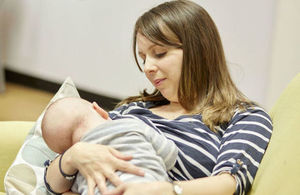Providing support and guidance on breastfeeding
How the NCT network of Baby Cafés is helping mothers across the UK.

A mother breastfeeding her baby © NCT, Oliver Edwards.
Summary
Baby Café is a National Childbirth Trust (NCT) network of around 60 drop–in centres helping around 7,500 mums each year across the UK. Expectant and new mums, their babies and partners, family members and friends can attend for free to benefit from support and guidance on breastfeeding, and social support from other parents.
What was involved
Surveys consistently show that most women want to breastfeed. Of those who stop within the first few weeks, 75% would actually have preferred to continue, but didn’t receive adequate skilled support.
Baby Café aims to give more women a more positive experience of breastfeeding; increase social support for women who are often isolated with young babies, increase the number of women breastfeeding at 6 to 8 weeks, and decrease the number of women stopping breastfeeding before they wanted to.
Baby Cafés are run by:
- midwives
- health visitors
- lactation consultants
- nursery nurses
- NCT breastfeeding counsellors who are qualified to Diploma level
The sessions are often supported by breastfeeding peer supporters, general volunteers and family support workers.
Sessions are held in an informal café-style environment and based around 12 quality standards that are closely aligned with the UNICEF Baby Friendly standards and in line with NICE recommendations. This ensures that the service:
- offers a welcoming environment
- provides a combination of social and clinical support
- promotes and supports breastfeeding at all stages
- is accessible to the whole community
Women state that the most common reasons to visit the service are:
- social support
- positioning and attachment advice
- sore nipples
- tongue tie
- night time and sleep advice
Women also attend for a variety of other breastfeeding concerns including slow weight gain, milk supply, thrush, mastitis and help with weaning or returning to work.
What works well
Baby Café facilitators identify women who need further support and will refer them to other local health and breastfeeding support services.
All Baby Cafés reported making recommendations for women to visit another health professional during 2015. Additionally, 75% made formal direct referrals to:
- GPs
- health visitors
- midwives
- other breastfeeding services
An evaluation of women attending Baby Cafes, conducted in 2015, found that over 7,500 women have benefitted from the service.
The report found that:
- over a third of the women attended more than once
- 1 in 5 women attended 2 or 3 times
- 1 in 10 women attended 6 times or more
One Baby Café user said:
Not once did I feel like I was failing or that it was never going to get better. Baby Café empowers. It’s as simple as that really!
A follow up of women a year after accessing Baby Café showed that 81% of mothers were able to breastfeed for as long as they intended, with 61% exclusively breastfeeding until 6 months and many more continuing to breastfeed in combination with formula. These rates are significantly above the UK average which shosw only 34% partial and 1% exclusive breastfeeding at 6 months.
75% of women felt that Baby Café had helped them to breastfeed for longer than they would have done otherwise, with 96% saying that the service was useful. Women valued the ongoing social support and expert advice, and the continuity of care provided by skilled facilitators.
Main learning points
Baby Café is run on a clear and consistent successful model, and many Baby Cafes are part of wider breastfeeding strategies to help meet UNICEF Baby Friendly standards for support in the community. The model is flexible enough to deliver to a range of community profiles and appeals to a wide range of families, including more vulnerable and socially isolated groups.
Baby Cafés are held weekly and take place in easy access venues such as community centres and church halls.
Baby Cafés reported using a wide range of methods to promote their services. Verbal recommendations from health visitors and midwives and liaison with local health professionals were named as the top methods of promoting the service with over 90% of cafés using these channels.
Next steps
Regular meetings can help cafés to develop and improve the quality of the service provided by identifying issues and ways of addressing them. Overall, 85% of Baby Cafés reported having some kind of regular meeting, though this was often an informal debriefing rather than a formal meeting.
As part of ongoing quality assurance of the Baby Café service, the national co-ordinator and a team of regional trainers have a programme of site visits for induction and update days in order to connect with staff on the ground and ensure the maintenance of the quality standards.
20 cafés received the training during 2015 and all but one said that it had been useful for learning and collaboration with other facilitators in the local area.
Funding is recognised as a major issue for many Baby Cafés going forward as it is a priority to ensure that services are free for families. Securing ongoing funding beyond initial setup costs is a particular problem in the current climate of health budget cuts.
Further information
Please email [email protected] to be put in touch with one of the NCT’s regional support managers.
Updates to this page
Published 12 May 2016Last updated 16 May 2016 + show all updates
-
Updated figures from 2013 to 2015.
-
First published.